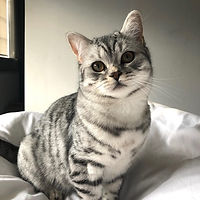HELLO!
Our extensive Veterinarian research into Feline Coronavirus (FCoV) & FIP over the decades has given us the expertise to ensure the best tailored support program for your cat.
Our consultancy services are here to support individual cat owners, vets and cat breeders as they address coronavirus or FIP in their cats.
In August 2021 BOVA Remdesivir and BOVA Oral GS-441524 became legally available to UK vets for the treatment of FIP in cats.
Some feline anti-viral drugs have not received RCVS or FDA approval for FCoV / FIP. Vets are limited in the amount of tailored prescriptive support they can provide openly for unlicensed versions of Remdesivir and Oral GS-441524.
Our Vets are all FIP & FCoV specialist licensed, practising vets around the world and speak English.
Dr Diane Addie is available for consultations for infectious disease control or diagnosis to veterinary hospitals, rescue shelters, boarding and breeding catteries and industry. She can only advise on licensed BOVA GS-441524 with the client's vet's consent. She is also available to laboratories for consultation for the development of diagnostic tests. www.catvirus.com
This Clinic is the only one worldwide that has reviewed experience with feline anti-virals for both FCoV & FIP across an increasing number of cats.

NEWS
PUBLICATIONS
OUR
SERVICES
SUPPORTIVE CARE
Feline Coronavirus and FIP can be frightening, we're here to help
CONSULTATION & ANALYSING TEST RESULTS
Our vet provides a friendly, cost effective interpretation of your cat's test results
MEDICATION ADVICE
What medication can be used with anti-viral drugs
BREEDERS & OWNERS
Clearing Coronavirus (FCoV) in cats and kittens and preventing FIP
DIAGNOSING
Coronavirus (FCoV) & FIP
DIETARY ADVICE
Supportive supplements and dietary recommendations
FIP
Treatment options
FCoV
Treatment options
Help Support Us
Preventing Feline Coronavirus (FCoV) & FIP
Our Clinic’s aim is to effectively manage FCoV viral loads in cats and kittens, to improve clinical signs, chronic diarrhoea, loss of weight and vomiting.
We also understand that in breeding catteries viral loads can be significantly high, and kittens leaving to their new homes can develop FIP within their first year of life.
Our Clinic’s protocols can help prevent FIP in cats and kittens by stopping the feline coronavirus from developing and eliminating it from the cat or kitten before it can increase and the FCoV mutate into the disease causing form called FIP.
What is Feline Coronavirus & FIP?
Feline infectious peritonitis (FIP) is a serious, nearly always fatal systemic viral disease of wild and domestic cats caused by a coronavirus (FCoV), a type of virus that afflicts cats.
The clinical name for the virus that causes FIP is feline coronavirus. A common, relatively benign form of feline coronavirus is the feline enteric coronavirus (FECV). When FECV mutates into a disease-causing form, it is called FIPV (feline infectious peritonitis virus). If a cat’s immune system responds poorly, the mutant FECV may cause the systemic infection called FIP.
Once a cat develops clinical FIP involving one or many systems of the cat’s body, the disease is progressive and is almost always fatal. The way clinical FIP develops as an immune mediated disease is unique, unlike any other viral disease of animals.
Why does FIP Happen?
Feline Infectious Peritonitis (FIP) is a disease caused by the feline coronavirus (FCoV). There are hundreds of different corona viruses but only 7 to 8 strains of them produce FIP.
With the assistance of the antibodies that are supposed to protect the cat, white blood cells are infected with the virus, and these cells then transport the virus throughout the cat’s body.
An intense inflammatory reaction occurs around vessels in the tissues where these infected cells locate, often in the abdomen, kidney, or brain. It is this interaction between the body’s own immune system and the virus that is responsible for the disease.
Wet FIP
In wet FIP, fluid accumulates in body cavities-typically in the abdominal cavity, where it causes progressive, but generally painless, swelling; or in the thoracic (chest) cavity, where it causes respiratory distress due to compression of the lungs and fluid backing up into the airways.
Dry FIP
In dry FIP, fluid buildup is minimal and symptoms depend on which organs are affected by lesions. About half of all dry cases produce eye inflammation or neurological problems: paralysis, unsteady gait, and seizures. Other lesions may cause kidney or liver failure. Weight loss, pancreatic disease, depression, anemia, and fever are usually present.
Neuro FIP
Neurological FIP is an extreme form of dry FIP, where the cat may exhibit fever, lack of appetite, weight loss, and lack of coordination and balance. Some cats may also develop spasms, seizures, and varying degrees of dementia. The eyes are vulnerable to problems too.
A kitten with Neuro FIP, before and during first five days' treatment.

ABOUT
OUR CLINIC
We have a breeding cattery and our experience in raising FCoV free kittens and having FCoV free cats has been the single most important preventative change that has improved the overall well being of our cats and litters of kittens.
We are the only consultancy that has effectively treated kittens under 16 weeks with FIP like symptoms and treating symptomatic feline coronavirus (FCoV) positive kittens from 6 weeks old to ensure they thrive without further complications.
Working with our vet consultant and one of the experimental anti-vitals will enable you to have the best tailored supportive care for diagnosing and managing FCoV or FIP in your cat or kitten.
We are regularly asked why we try to prevent coronavirus (FCoV).
Some breeds, younger cats, and older cats with weaker immune systems, are more sensitive to the coronavirus (FCoV) and develop complications as a result.
Older cats and kittens can lose weight or have gastroenteritis that does not respond to antibiotics. In very young kittens FCoV may cause stunted growth and death, not through FIP but through the overload the virus places on their immature immune system.
Until now there has not been an effective quick treatment, here at our clinic we take pride in showcasing the first kittens to have been cleared of the FCoV virus.
CONTACT
US
CONTACT US
Please note that we are not affiliated with any producer of anti-viral drugs.
We do not sell, nor can we legally source such drugs for other people and we will not respond to any queries along these lines.
Current research is showing Molnupiravir is providing good results.
Your vet may be able to obtain GS or Molnupiravir for you.














